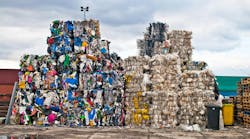EPA announces $7.5B available in WIFIA funding
The U.S. EPA has announced $7.5 billion in available funding for stormwater, drinking water and wastewater infrastructure through Water Infrastructure Finance and Innovation Act (WIFIA) funding.
This announcement initiates EPA’s 7th round of WIFIA financing with $6.5 billion available through the WIFIA program and $1 billion available through the State WIFIA (SWIFIA) program, which provides loans exclusively for State infrastructure financing authority borrowers.
EPA is currently accepting letters of interest for both WIFIA and SWIFIA loans. Prospective borrowers can also receive technical assistance to develop a funding request that meets the WIFIA program’s requirements. This assistance will help small and disadvantaged communities benefit from WIFIA funding.
For this new round of funding, EPA has identified priority areas such as: increasing investment in economically stressed communities; making rapid progress on lead service line replacement; addressing PFAS and emerging contaminants; mitigating the impacts of drought and supporting water innovation and resilience.
The low-interest loan programs helps communities to invest in water infrastructure while savings millions of dollars. To date, EPA’s WIFIA program has announced $19 billion to help finance 109 projects across the country.
“When we invest in water, we support healthy people, economic opportunity, environmental protection, and good-paying local jobs,” said EPA Administrator Michael S. Regan. “This new funding from the WIFIA program – coupled with President Biden’s historic $50 billion investment in water through the Bipartisan Infrastructure Law – bolsters EPA’s efforts to ensure communities across the country have solid water infrastructure and reliable access to safe and clean water.”
Using previously announced funding, EPA has awarded WIFIA loans to benefit dozens of communities, including:
- Pittsburgh Water and Sewer Authority in Pennsylvania closed a $52 million WIFIA loan to upgrade and replace aging water infrastructure to ensure that residents and businesses can rely on safe drinking water.
- Polk Regional Water Cooperative in Florida received $305 million to sustain the local drinking water supply and alleviate the strain on the Upper Floridan Aquifer.
- City of Santa Cruz, California closed a $128 million WIFIA loan to upgrade their drinking water system to be more resilient to drought and climate change.
- City of Wichita, Kansas closed a $191 million WIFIA loan to upgrade two critical wastewater facilities, advancing technologies for water reuse and reducing the nutrient loads in the Arkansas River and Mississippi River Basin.
- San Francisco Public Utilities Commission in California closed a $369 million WIFIA loan to enhance resiliency to seismic events and climate change and reduce the risk of combined sewer overflows.
- New Jersey Infrastructure Bank closed a $500 million SWIFIA loan that will help modernize wastewater and drinking water systems serving over 10 million people throughout New Jersey.
- City of Boise, Idaho closed a $263 million WIFIA loan to improve wastewater treatment processes to protect the Boise River’s water quality.
- City of Chattanooga, Tennessee closed a $186 million WIFIA loan to improve its wastewater system’s energy efficiency and resilience to extreme weather.
Established by the Water Infrastructure Finance and Innovation Act of 2014, the WIFIA program is a federal loan program administered by EPA. The WIFIA program’s aim is to accelerate investment in the nation’s water infrastructure by providing long-term, low-cost, supplemental credit assistance for regionally and nationally significant projects. The WIFIA program has an active pipeline of pending applications for projects that will result in billions of dollars in water infrastructure investment and thousands of jobs for local communities.


